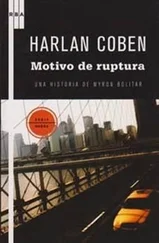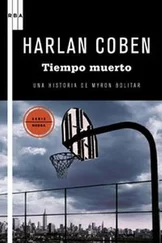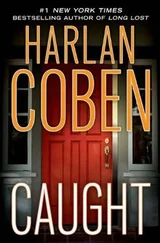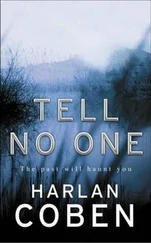"Yeah," Loren said softly in the car. "I'd like that a lot."
The second and third messages blew that idea out of the water. They were both from her boss, County Prosecutor Ed Steinberg, and were short and to the point. The first one said: "Call me. Now." The second one said: "Where the hell are you? Call me. Doesn't matter what the hour. Disaster on the way."
Ed Steinberg was not one for overstatement or for having people call at all hours. He was old-fashioned in that approach. Loren had his home number somewhere- not on her, unfortunately- but she had never used it. Steinberg didn't like to be bothered during off hours. His motto was: Get a life, it can wait. He was usually out of the office by five o'clock and she couldn't recall a time when she'd seen him in his office after six.
It was six thirty now. She decided to try his office line first. Thelma, his secretary, might still be there. She'd know how to reach him. After one ring, the phone was picked up by Ed Steinberg himself.
This was not a good sign.
"Where are you?" Steinberg asked.
"On the way back from Delaware."
"Come straight back here. We got a problem."
LAS VEGAS, NEVADA
FBI FIELD OFFICE
JOHN LAWRENCE BAILEY BUILDING
OFFICE OF THE SPECIAL AGENT IN CHARGE
FOR ADAM YATES IT STARTED out as another day.
At least, that was what he wanted to believe. In a larger sense, no day was ever just another for Yates- at least, not for the past ten years. Each day felt like borrowed time, waiting eternally for the proverbial ax to fall. Even now, when most rational people would conclude that he'd successfully put his past mistakes behind him, the fear still gnawed in the back of his brain, tormenting him.
Yates had been a young agent then, working undercover. Now here he was, ten years later, the SAC- Special Agent in Charge- for all of Nevada, one of the FBI's most plum positions. He had risen up the ranks. In all that time, there had not been the smallest inkling of trouble.
So heading into work that morning, it seemed to be another day.
But when his chief advisor, Cal Dollinger, walked into his office, even though neither had spoken about the incident in nearly a decade, something in his old friend's face told him that this was indeed the day, that all others had merely been leading up to this.
Yates glanced quickly at the photograph on his desk. It was a family shot- he, Bess, the three kids. The girls were in their teens now, and no amount of training adequately prepares a father for that. Yates stayed seated. He wore his casual uniform- khakis, no socks, brightly hued polo shirt.
Cal Dollinger stood over his desk and waited. Cal was huge- six-seven and nearly three hundred pounds. Adam and Cal went way back, having first met as eight-year-olds in Mrs. Colbert's third-grade class at Collingwood Elementary School. Some men called them Lenny and George, referring to the Steinbeck characters in Of Mice and Men . There might be some truth to it- Cal was big and impossibly strong- but where Lenny had a gentleness, Cal had none. He was a rock, both physically and emotionally. He could indeed kill a rabbit by petting it, but he wouldn't care much.
But their bond was even stronger than that. You go back enough years, you pull each other out of enough fires, you become like one. Cal could be cruel, no question about it. But like most violent men, it was just a question of black and white. Those in his very small white zone- his wife, his kids, Adam, Adam's family- he'd protect with his dying breath. The rest of the world was black and inanimate, a distant backdrop.
Adam Yates waited, but Cal could wait longer.
"What is it?" Adam finally asked.
Cal's eyes swept the room. He feared listening devices. He said, "She's dead."
"Which one?"
"The older."
"Are you sure?"
"Her body was found in New Jersey. We ID'd her by the serial numbers on the surgical implants. She was living as a nun."
"You're kidding."
Cal did not smile. Cal did not kid.
"What about"- Yates didn't even want to say Clyde's name-"him?"
Cal shrugged. "No idea."
"And the tape?"
Cal shook his head. It was as Adam Yates had expected. It wouldn't end easily. It would never end at all. He cast one more glance at his wife and children. He looked about his spacious office, the commendations on the wall, his nameplate on the desk. All of it- his family, his career, his entire life- seemed wispy now, like holding smoke in a hand.
"We should go to New Jersey," he said.
SONYA MCGRATH WAS SURPRISED to hear the key in the lock.
Today, more than a decade after her son's death, the photographs of Stephen were still in the same frames on the same side tables. Other photographs had been added, of course. When Michelle, Sonya's oldest daughter, got married last year, they naturally took photographs. Several were framed over the fireplace. But no pictures of Stephen had ever been taken down. They could pack away his things, repaint his room, give his clothes to charity, sell his old car, but Sonya and Clark could never touch those photographs.
Her daughter Michelle, like many brides, had chosen to do the standard group photographs before the marriage ceremony. The groom, a nice guy named Jonathan, had a large extended family. They took all the usual shots. Sonya and Clark had gamely posed- with their daughter, with their daughter and soon-to-be son-in-law, with Jonathan's parents and the new bride and groom, whatever, but they balked when the photographer called for the "McGrath family photograph," the one that would have consisted of Sonya and Clark and Michelle and Cora, Michelle's younger sister, because all any of them would ever see, even after this joy-filled day, was the giant hole in the "McGrath family photograph" where Stephen still belonged.
The big house was silent tonight. It had been that way since Cora started college. Clark was "working late again"- a euphemism for "sleeping with the bimbette"- but Sonya didn't care. She didn't question his hours because their home was even lonelier, even more silent, when Clark was here.
Sonya swirled the brandy in the snifter. She sat alone in the new theater room, in the dark, cuing up a movie on DVD. She'd rented something with Tom Hanks- his presence, even in crummy movies, oddly comforted her- but she hadn't hit the play button yet.
God, she thought, am I really this pitiful?
Sonya had always been a popular woman. She had many true and wonderful friends. It would be easy to blame them, to say that they slowly disengaged themselves from her after Stephen's death, that they had tried to be dutiful but after a while, you can only take so much, and so they made one excuse, and then another, gradually drifting away, cutting ties.
But that would not be fair to them.
It might be true in some small part- there had certainly been a detachment of sorts- but Sonya had been far more responsible for that than any of her friends. She pushed them away. She did not want comfort. She did not want company or camaraderie or commiseration. She didn't want to be miserable either, but perhaps that was the easiest and ergo best alternative.
The front door opened.
Sonya turned on the small lamp next to her movie-theater recliner. It was dark outside, but in this airless room that didn't matter. The shades blocked out all light. She heard the footsteps in the marble foyer and then on the polished hardwood floors. They were coming toward her.
She waited.
A moment later, Clark stepped into the room. He said nothing, just stood there. She studied him for a moment. Her husband looked somehow older, or maybe it had been a long time since she had really studied the man she'd married. He'd chosen not to go distinguished gray and took to coloring his hair. The coloring was done, as with all things Clark, meticulously, but it still didn't look right. His skin had an ashen tone. He looked thinner.
Читать дальше












